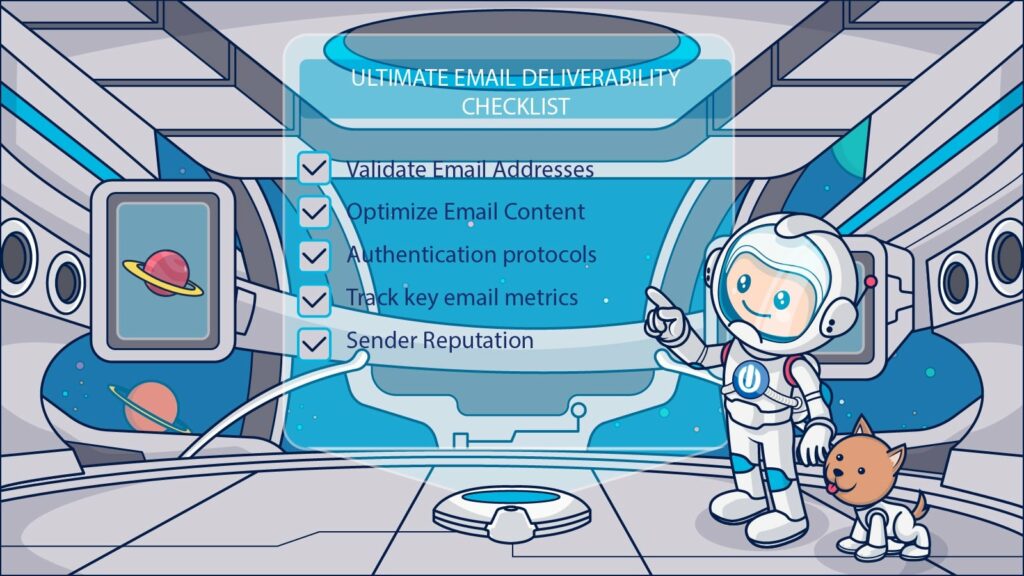Email marketing is about imparting the right message and giving subscribers the clearest possible idea of your identity and priorities as a brand. However, this can be challenging since email provides a relatively small window in which you can share such messages.
As such, the content of your marketing emails needs to be well thought out and carefully crafted. Furthermore, you should take care to refine every feature of your outgoing messages, as small details can influence the eventual success of your marketing initiatives, as can be seen in our newsletter examples blog.
The email footer is an example of something that can help you optimize your emails.
What is an email footer?
An email footer is a content block that closes out a message. It can be found at the bottom of an email, below all of the main body content. Typically, an email footer features information that is not a part of the main message of the email, but that is still important for readers to know.
Footers are an essential part of email marketing, both from a legal standpoint and also from a marketing perspective.
What information does an email footer contain?
The specific content included within an email footer can vary from one sender to the next. However, as a result of regulations laid out by laws such as CAN-SPAM and GDPR, there are some elements that senders should include to stay compliant, such as:
- An unsubscribe link/email preference option.
- The company’s registered office address.
- A reference and link to the privacy policy of your organization.
Including the above details can help you remain regulation compliant, but it may also be necessary to include certain disclaimers and other legal information depending on local laws.
Aside from that, there are a wide variety of other details that you can include in your footer to get the most out of the available space and achieve your marketing goals. Among others, email footers may include the following pieces of information:
- Call-to-action buttons and referral links.
- Social media information and links.
- Permission reminders with details of the subscriber’s opt-in.
- The recipient’s email address.
- Update links for user profiles and preferences.
- A copyright notice.
- A safelist request.
- The name of your company.
- Your company’s logo, wordmark, or tagline.
Using merge tags, it’s also possible to have the information in your footer change dynamically to include information that is specific to each subscriber.
Why email footers are important
As mentioned above, the information you include in your footer is of considerable importance as it helps ensure that you stay compliant with your email communications. However, your footer can yield other benefits, depending on the other information you choose to include in it, such as:
Improving brand image and recognition
Including brand information such as a company logo, wordmark, or tagline in your email footer demonstrates a level of professionalism on your part, inspiring confidence in your subscribers.
Moreover, it is a great way of reminding subscribers who you are and what you are all about. In the long term, this can help elevate your company’s profile, which helps it achieve greater levels of success.
Driving engagement
Email users are much more responsive to emails that contain personalized information, and that principle extends to footers.
By including recipient details and permission reminders in your email footer, you can create a more personal experience for subscribers.This drives engagement, which will be reflected in the success metrics of your campaign.
Generating leads and conversions
Footers can also play an important role in helping subscribers progress along their customer journey.
By including links and CTAs in your email footer, you can help encourage readers to take the next step in their journeys. This can boost lead generation and help you achieve more conversions with your marketing initiatives.
Conclusion
In email marketing, you must make optimal use of every resource at your disposal if you are to achieve success. That means that rather than focusing entirely on body content, you should strive to optimize every facet of your marketing emails, including your email footer.
While footers play an important role in helping you stay regulation-compliant, they can also be used creatively to improve interactions with subscribers. As a result, they can have a considerable impact on the success of a large-scale email marketing campaign.
Although subject lines, preheaders, and body content most often catch the eye, footers are an equally important part of email communication.
All told, email footers provide you with a valuable opportunity to impart key information to your subscribers, and that’s an opportunity that no marketer should pass up.













